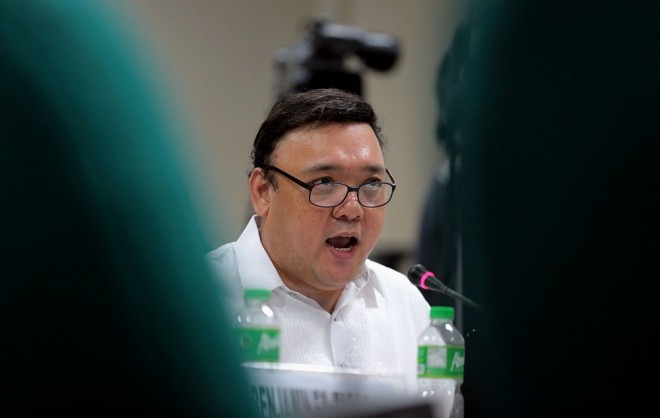ICC lacks jurisdiction to try Duterte for crimes vs humanity—solon
Kabayan Rep. Harry Roque, an expert on international law, said moves to have President Rodrigo Duterte tried for crimes against humanity before the International Criminal Court (ICC) are doomed to fail.
This is because the ICC, of which the Philippines is a state party, is the court of last resort, and a petitioner may only file a case before the ICC after exhausting all legal remedies in the home country.
“Because of complementarity and lack of jurisdiction. Managinip sila (Dream on). Do not think you can go directly to the ICC because the states will never agree to that. It’s the court of last resort,” Roque said.
In an earlier statement, Roque said according to the Principle of Complementarity enshrined in Articles 1 and 17 of the Rome Statute, the ICC will only exercise jurisdiction when Philippine courts are unwilling or unable to do so.
This means Philippine courts have primary jurisdiction in any complaint for crimes against humanity, Roque said.
Article continues after this advertisementRoque also questioned if the killings in the administration’s war on drugs could amount to crimes against humanity.
Article continues after this advertisement“Primarily, to constitute a crime against humanity, it must be shown that there are acts of murder, persecution, or other prohibited acts, committed as part of a widespread or systematic attack directed against a civilian population. Critics would argue that because there have been many incidents of drug-related violence, that a crime against humanity must have been committed,” Roque said.
Roque said it remains to be seen if the administration’s narcotics crackdown is a “systematic” plan to kill drug personalities.
The administration also allows for drug users to surrender to the police, he added.
“We can see, however, that while there may have been errors in the manner by which crime has been addressed in the country, it is difficult to see the entire campaign against drugs as one systematic plan to kill drug personalities,” Roque said.
“The fact that over a million people, including drug surrenderers, have been peacefully placed under the jurisdiction of the State shows that the primary intention has always been simply to end the propagation of illegal drugs in the country,” he added.
It was Edgar Matobato, a self-proclaimed member of the Davao Death Squad who claimed to have killed criminals under Duterte’s orders when the latter was Davao City mayor, who first floated a plan to file a case against Duterte in the ICC.
Albay Rep. Edcel Lagman, a vocal critic of Duterte, earlier said the ICC may try Duterte for crimes against humanity over the spate of extrajudicial killings at the height of the administration’s brutal war on drugs which has left over 7,000 dead.
In a press conference at the House of Representatives on Tuesday, Lagman said the ICC can step in to try Duterte for the killings if the government institutions could not provide an impartial investigation into the slain drug pushers and users in the narcotics crackdown.
READ: Lagman says ICC may try Duterte for crimes against humanity
“The Duterte administration must not dismiss with cavalier attitude the possibility of the International Criminal Court taking jurisdiction over charges against President Duterte for involvement, enticement and/or condonation of extrajudicial killings related to the deadly campaign against the drug menace which may be considered crimes against humanity,” Lagman said.
Lagman said the Philippines ratified the Rome Statute of the ICC in 2011, making the country the 117th state party and the second Asean country to do so.
Lagman added that Republic Act 9851 or the “Philippine Act on Crimes Against International Humanitarian Law, Genocide and Other Crimes Against Humanity” institutionalizes the principle of command responsibility.
Under the law, “a superior shall be criminally responsible as a principal for such crimes committed by subordinates under his/her effective command or control or effective authority and control as the case may be as a result his/her failure to properly exercise control over such subordinates.”
Lagman said the ICC may try Duterte if government institutions like the Department of Justice fail to give an impartial investigation into the extrajudicial killings.
“But such state-initiated investigations, prosecutions, and trials should not be a mere facade, but rather an impartial, honest, and good faith investigation, prosecution, and trial. Otherwise, the ICC can step in, pursuant to the principle of complementarity, if the Philippines is shown to be unwilling or unable to investigate, prosecute, and try in good faith,” Lagman said. JE
RELATED STORIES
De Lima: Killings may lead to charges of crimes against humanity
